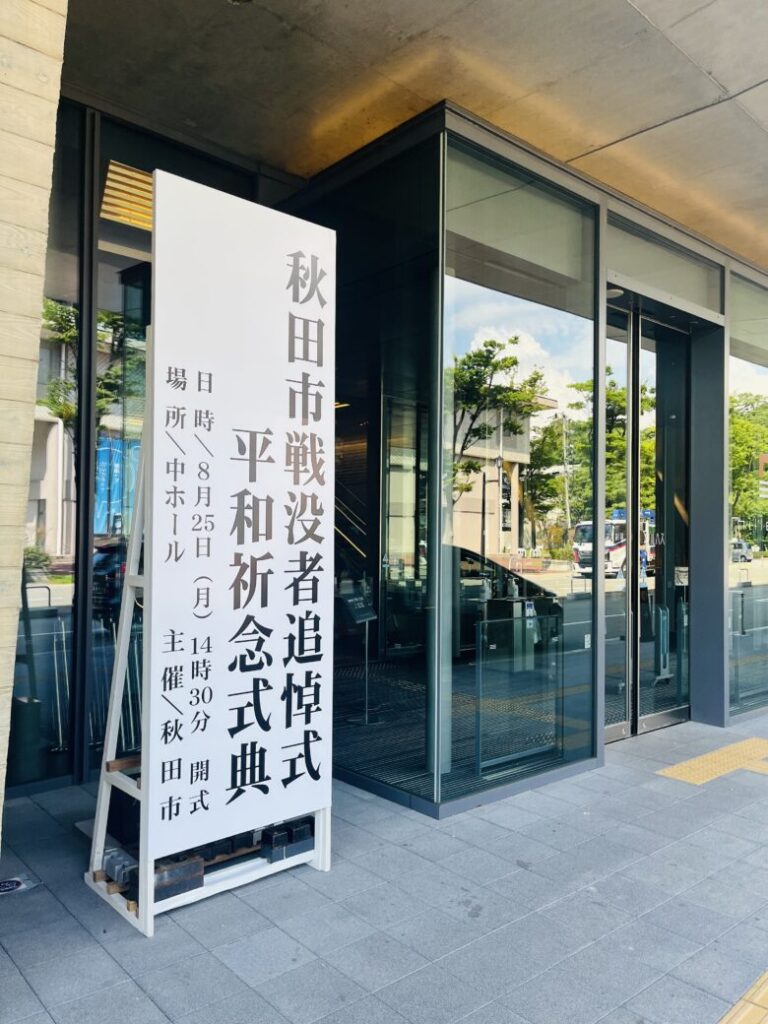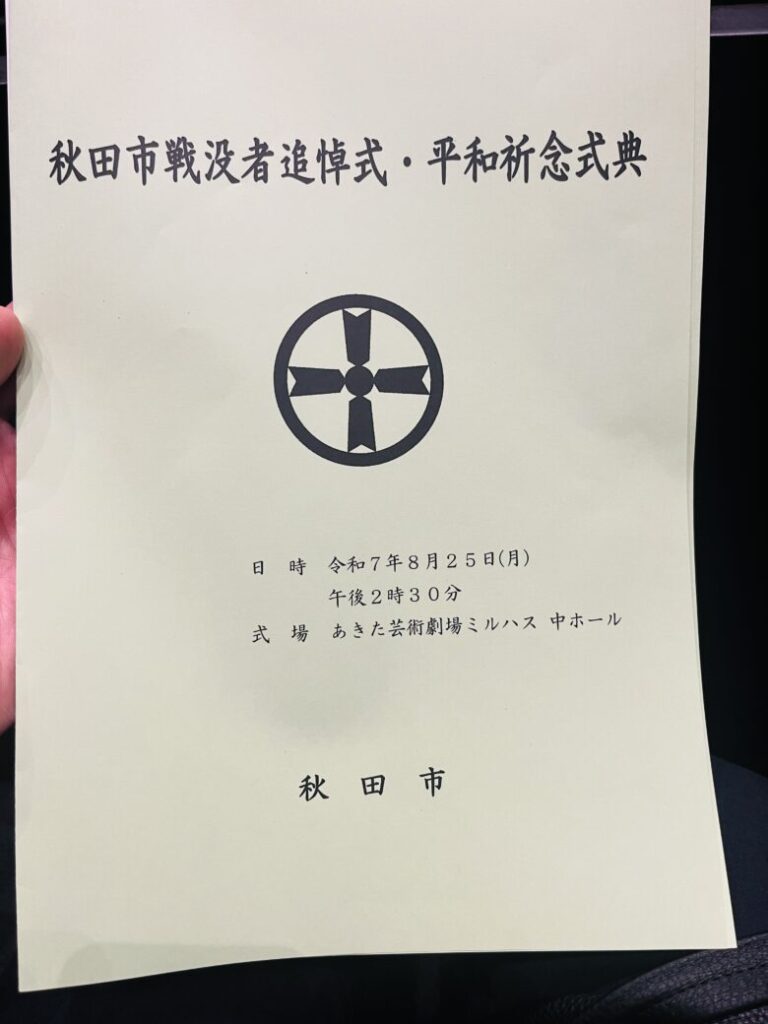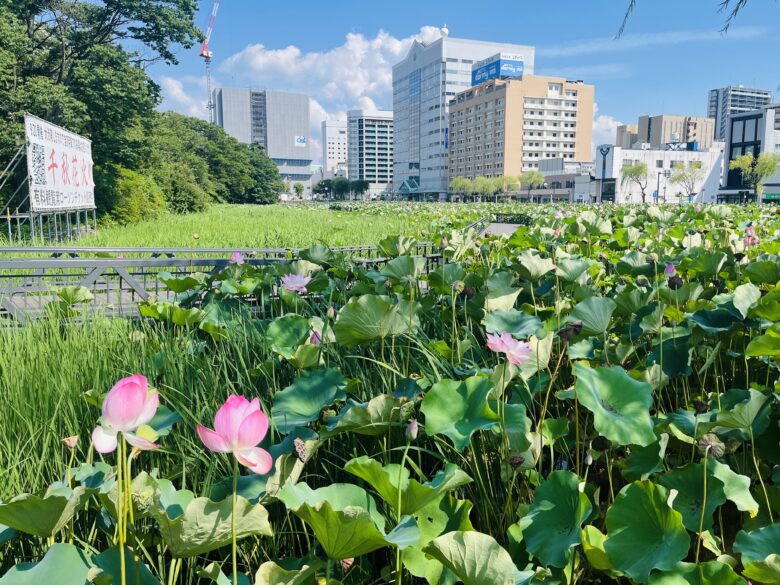2025年8月25日(月)に、秋田市のあきた芸術劇場ミルハスで行われた戦没者追悼式・平和祈念式典に出席しました。今年が昭和で言うと100年、戦後80年の節目に当たりますので、4,400人余りにのぼる秋田市の戦没者を追悼する式典には、遺族や市民など約300人が参列して、犠牲になった英霊たちの冥福を祈りました。
私の父は祖父母と共に幼少期に満州で暮らしており、引き上げてくる時に弟が亡くなった、ということを思い出しましたが、私が20代終わりまでに全員亡くなりましたので、今となっては詳しい話が聞けないなぁと思うところです。
なぜ父のことを思い出したかというと、遺族代表で追悼の言葉を話された北川セチ子さんは84歳ということで、もし生きていれば父と同じ歳でしたし、その言葉の中で、父や義理の父までも満州に派遣され、帰らぬ人となったこと、その後の生活の苦労などを聞いたからでした。祖父は当時文化人類学の研究者だったため、多少中国語が話せたようで、軍人として前線には行かず、その代わり文民として男手のほとんどない女性と子どもばかりのコミュニティのまとめ役だったと聞いていました。ですので、引き上げ時には、幼かった私の父も含めたくさんの女性と子どもたちを率いて帰ってきたのだとか。その行程はかなり厳しいもので、父の弟はそこで亡くなったと聞いています。
また、公募した平和のメッセージの最優秀賞の作品が発表され、土崎小学校6年の渡部はるひさんと岩見三内中学校3年の石塚菜々美さんがそれぞれの思いを主張され、石塚さんが、戦争の愚かさと悲しみを語り継いでいきたいと話しておられました。
個人的に思うことは、戦争の悲惨さを伝える平和教育が、果たして正しいのかということです。自分から選択して戦争に関する映画や映像・資料を見たり調べたりと、取捨選択できるのならばいいと思いますが、一方的に恐ろしく悲惨な体験や映像・資料などを与えられ、「ほら怖いでしょう、だから戦争はダメなんだ」というスタイルは、子どもの感情を暴力的に支配しているのと変わらないのではと思うときがあります。
昨今、SNSやウェブではウクライナやガザ地区での戦闘の映像が溢れ、近代の戦闘のリアルを簡単に見ることができます。デジタルネイティブ世代は、戦争の悲惨さを伝える平和教育に疑問を感じ始めているのではないでしょうか。それよりも、実際の戦争になった時にどうするのか、戦争にならないためにはどうするのかをきちんと彼らなりに考えているのではないでしょうか。
平和を声高に叫ぶだけの平和教育は、時として国のために戦った兵士を蔑み、いつまでも戦争責任を叫ぶ国々に諂い、日本人としての尊厳を削ってきたように思います。私は海外で長く生活していましたが、海外に出て初めて日本ほど母国を愛せていない国はないと感じました。母国を愛している、と胸を張って言うのが当然のことなのに、今の日本でそんなことを言うと右翼扱いされるのではないでしょうか。悲しいことです。日教組の影響、教育を通した刷り込みが国全体に及ぶということはある意味恐ろしいことでもあり、それだけ教育というのは重要なことであり、きちんと考えて向き合っていかねばならないと感じ、深く考えた1日になりました。




【English】250825 – Attended the Memorial Ceremony for the War Dead and the Peace Ceremony
On August 25, 2025, I attended the Memorial Ceremony for the War Dead and the Peace Ceremony held at the Akita Arts Theatre Milhas. This year marks 100 years since the beginning of the Showa era and 80 years since the end of the war. About 300 people, including bereaved families and citizens, gathered to remember and pray for the more than 4,400 people from Akita City who lost their lives in the war.
While listening, I thought of my father. As a child, he lived in Manchuria with my grandparents. When they returned to Japan, his younger brother died during the difficult journey. My father and grandparents have already passed away, so I can no longer hear the details directly from them.
I was reminded of this because Ms. Sechiko Kitagawa, who gave a memorial speech as a representative of the bereaved families, is 84 years old—the same age my father would have been. She spoke about how both her father and father-in-law were sent to Manchuria and never came back, and about the hardships that followed. My grandfather, who had been a cultural anthropologist, could speak some Chinese, so instead of going to the front lines, he helped organize the community of mostly women and children. He later returned to Japan leading many of them, including my father. But it was a severe journey, and my father’s younger brother died along the way.
At the ceremony, two students were awarded for their Peace Messages: Haruhi Watanabe, a 6th grader at Tsuchizaki Elementary School, and Nanami Ishizuka, a 3rd-year student at Iwamisannai Junior High School. Ms. Ishizuka said she wanted to keep telling people about the foolishness and sadness of war.
Personally, I sometimes wonder if the way peace education is taught is always the best. If young people choose for themselves to watch films, read materials, or study about war, that can be meaningful. But when they are forced to see only terrible and sad images with the message “See, war is bad,” it may feel like their emotions are being controlled.
Today, on social media, we can easily see real images of wars in Ukraine or Gaza. Young people, who grew up with digital media, may be questioning whether traditional peace education is effective. Instead, they may be thinking more about what to do if war actually happens, or what must be done to prevent it in the first place.
I also think that peace education which only shouts “No to war” can sometimes make us look down on those who fought for our country, and can weaken our national pride. Having lived abroad, I felt that Japan is one of the few countries where people hesitate to openly say they love their own country. In Japan, if you say so, you might be labeled as extreme, which I find very sad.
Education shapes how an entire country thinks, and that can be both powerful and frightening. That is why we must always think carefully about how peace and war are taught. This ceremony made me reflect deeply on these issues.
【Español】250825 – Asistí a la Ceremonia en Memoria de los Caídos en la Guerra y al Acto por la Paz
El 25 de agosto de 2025 asistí a la Ceremonia en Memoria de los Caídos en la Guerra y al Acto por la Paz, que se realizó en el Teatro de Artes de Akita, Milhas. Este año se cumplen 100 años desde el inicio de la era Shōwa y 80 años desde el fin de la guerra. Aproximadamente 300 personas, entre familiares y ciudadanos, participaron para recordar y orar por más de 4,400 personas de la ciudad de Akita que perdieron la vida en la guerra.
Mientras escuchaba, pensé en mi papá. Cuando era niño vivió en Manchuria con mis abuelos. Al regresar a Japón, su hermano menor murió durante el duro viaje. Mi padre y mis abuelos ya fallecieron, así que ahora no puedo escuchar los detalles directamente de ellos.
Recordé esto porque la señora Sechiko Kitagawa, quien habló en nombre de las familias de los caídos, tiene 84 años, la misma edad que tendría mi papá. Ella contó que tanto su padre como su suegro fueron enviados a Manchuria y nunca regresaron, y también habló de las dificultades de la vida después de eso. Mi abuelo, que era investigador de antropología cultural, sabía algo de chino y por eso no fue al frente de batalla, sino que ayudó a organizar la comunidad compuesta casi solo por mujeres y niños. Luego regresó a Japón guiando a muchos de ellos, incluido mi padre. Pero el viaje fue muy duro, y allí murió el hermano menor de mi padre.
En la ceremonia también se entregaron premios a dos estudiantes por sus Mensajes de Paz: Haruhi Watanabe, estudiante de sexto grado de la Escuela Primaria Tsuchizaki, y Nanami Ishizuka, estudiante de tercer año del Colegio Iwamisannai. La señorita Ishizuka dijo que quería seguir transmitiendo la tristeza y la necedad de la guerra.
En lo personal, a veces me pregunto si la forma en que se enseña la paz siempre es la mejor. Si los jóvenes deciden por sí mismos ver películas, leer materiales o investigar sobre la guerra, eso puede ser valioso. Pero cuando solo se les muestran imágenes terribles y tristes con el mensaje “¿Ves?, la guerra es mala”, puede sentirse como si se intentara controlar sus emociones.
Hoy en día, en redes sociales, podemos ver fácilmente imágenes reales de las guerras en Ucrania o en Gaza. Los jóvenes, que crecieron con lo digital, quizás se pregunten si la educación para la paz tradicional es realmente efectiva. Más bien, podrían estar pensando en qué hacer si hubiera una guerra de verdad, o cómo evitar que suceda.
También pienso que una educación para la paz que solo grita “No a la guerra” a veces puede hacernos menospreciar a quienes lucharon por el país, y debilitar nuestro orgullo nacional. Cuando viví en el extranjero, sentí que Japón es uno de los pocos países donde la gente duda en decir con orgullo que ama a su patria. En Japón, si alguien lo dice, puede ser visto como extremista, lo cual me parece muy triste.
La educación moldea la manera de pensar de todo un país, y eso puede ser algo poderoso pero también riesgoso. Por eso debemos reflexionar bien sobre cómo enseñamos la paz y la guerra. Esta ceremonia me hizo pensar profundamente en estos temas.
